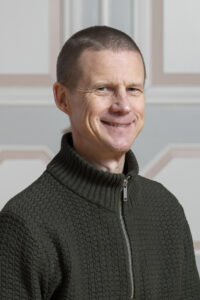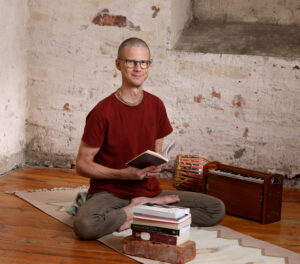29.5.2024
There is a myriad of yoga courses available for those interested, academic studies in yoga on the other hand are much more scarce. This is a situation which the Open University at Åbo Akademi University (ÅAU) will correct in Autumn 2024.
Not perhaps as common as a plate of porridge just yet, but yoga as a phenomenon today is far more everyday business than let’s say 30 years ago. This conclusion was reached by Janne Kontala who holds a PhD in Study of Religions and currently is a teacher in a new study module (25 ECTS) on yoga offered by the Open University at ÅAU.
-There are approximately 300 million yoga practitioners all over the world today. A growing number of westerners have tried out yoga in one way or another, says Kontala.

Kontala started practicing yoga early in the nineties and soon became a certified yoga teacher alongside his academic studies in Study of Religions which eventually led him to earn a PhD degree. He is currently conducting research within a project in Study of Religions at Åbo Akademi University. The aim of the research project is to gain a broader insight of yoga practitioners’ actual relation to yoga. Being part of both the academic world and the yoga community at the same time, is a big advantage according to him. Kontala has taught courses in Study of Religions on several occasions, Hinduism and Buddhism being some of the subjects. Along the way, he has gotten the impression that many yoga practitioners in fact have academic backgrounds. Studies conducted in Finland and other countries also support his findings.
The pizza effect
Yoga today consists of many schools and lineages. It might be tempting to perceive modern yoga as being significantly different from the pre-modern yoga. But there are in fact interesting similarities regarding the philosophy behind the practice, Kontala says but also refers to the so called “pizza effect”. This effect will indeed be problematized in the upcoming courses. Those unfamiliar with the pizza effect, will be introduced to the phenomenon in the context of yoga. The courses will furthermore familiarize the participants with the historical development of yoga. Participants will also learn the key concepts as well as to understand classic texts based on good translations. Yoga as a social phenomenon, its relation to religion and the yoga philosophy are also central topics of the study module. You do not have to practice yoga in order to participate in these courses, Kontala informs. But, if you are a yoga practitioner, you might appreciate to learn how modern yoga developed through centuries and reflect upon the novelties it displays as well as similarities to pre-modern yoga. The module of 25 ECTS offers an in-depth study of various aspects of yoga, although one topic is intentionally left out.
-Since this is a humanities program, we will not address the topic of yoga in connection with medical science, Kontala adds.

The Academic study of yoga
The module about to be offered by the Open University at ÅAU is more affordable than many other academic programs in yoga offered internationally. It starts in Autumn 2024 as “Modern Yoga, 5 ECTS” begins, followed by four other courses: Yogas Roots in South-Asian Religiosity, Philosophy of Yoga, Tantra and Hatha-Yoga and Specialization in Yoga. You may participate in all five courses or just a few of your preference. The courses are primarily aimed for adult students, however degree students are also welcome if there are available seats. The courses are also available for students in the CHARM-EU-alliance.
If you are interested in the Yoga courses, please contact Education planner Maria Holmberg, maria.c.holmberg(a)abo.fi for further information.